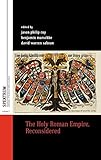The Holy Roman Empire, Reconsidered / ed. by Jason Philip Coy, David Warren Sabean, Benjamin Marschke.
Material type: TextSeries: Spektrum: Publications of the German Studies Association ; 1Publisher: New York ; Oxford : Berghahn Books, [2010]Copyright date: ©2010Description: 1 online resource (346 p.)Content type:
TextSeries: Spektrum: Publications of the German Studies Association ; 1Publisher: New York ; Oxford : Berghahn Books, [2010]Copyright date: ©2010Description: 1 online resource (346 p.)Content type: - 9781845457594
- 9781845459925
- 943/.02 23
- online - DeGruyter
| Item type | Current library | Call number | URL | Status | Notes | Barcode | |
|---|---|---|---|---|---|---|---|
 eBook
eBook
|
Biblioteca "Angelicum" Pont. Univ. S.Tommaso d'Aquino Nuvola online | online - DeGruyter (Browse shelf(Opens below)) | Online access | Not for loan (Accesso limitato) | Accesso per gli utenti autorizzati / Access for authorized users | (dgr)9781845459925 |
Frontmatter -- CONTENTS -- ILLUSTRATIONS -- SERIES PREFACE -- PREFACE -- CONTRIBUTORS -- INTRODUCTION The Holy Roman Empire in History and Historiography -- SECTION I Presence, Performance, & Text -- CHAPTER 1 Discontinuities Political Transformation, Media Change, and the City in the Holy Roman Empire from the Fifteenth to Seventeenth Centuries -- CHAPTER 2 Overloaded Interaction Effects of the Growing Use of Writing in German Imperial Cities, 1500–1800 -- CHAPTER 3 Princes’ Power, Aristocratic Norms, and Personal Eccentricities: Le Charactère Bizarre of Frederick William I of Prussia (1713–1740) -- SECTION 2 Symbolic Meaning, Identity, & Memory -- CHAPTER 4 The Illuminated Reich: Memory, Crisis, and the Visibility of Monarchy in Late Medieval Germany -- CHAPTER 5 The Production of Knowledge about Confessions: Witnesses and their Testimonies about Normative Years In and After the Thirty Years’ War -- CHAPTER 6 Staging Individual Rank and Corporate Identity: Pre-Modern Nobilities in Provincial Politics -- CHAPTER 7 The Importance of Being Seated: Ceremonial Conflict in Territorial Diets -- SECTION 3 Ceremony, Procedure, & Legitimation -- CHAPTER 8 Ceremony and Dissent: Religion, Procedural Conflicts, and the “Fiction of Consensus” in Seventeenth-Century Germany -- CHAPTER 9 Contested Bodies: Schwäbisch Hall and its Neighbors in the Conflicts Regarding High Jurisdiction (1550–1800) -- CHAPTER 10 Conflict and Consensus Around German Princes’ Unequal Marriages: Prince’s Autonomy, Emperor’s Intervention, and the Juridification of Dynastic Politics -- CHAPTER 11 Power and Good Governance: The Removal of Ruling Princes in the Holy Roman Empire, 1680–1794 -- SECTION 4 Imperial Institutions, Confession, & Power Relations -- CHAPTER 12 Marital Affairs as a Public Matter within the Holy Roman Empire: The Case of Duke Ulrich and Duchess Sabine of Württemberg at the Beginning of the Sixteenth Century -- CHAPTER 13 The Corpus Evangelicorum: A Culturalist Perspective on its Procedure in the Eighteenth-Century Holy Roman Empire -- CHAPTER 14 Gallican Longings: Church and Nation in Eighteenth-Century Germany -- CONCLUSION New Directions in the Study of the Holy Roman Empire— A Cultural Approach -- Glossary -- Bibliography -- INDEX
restricted access online access with authorization star
http://purl.org/coar/access_right/c_16ec
The Holy Roman Empire has often been anachronistically assumed to have been defunct long before it was actually dissolved at the beginning of the nineteenth century. The authors of this volume reconsider the significance of the Empire in the sixteenth, seventeenth, and eighteenth centuries. Their research reveals the continual importance of the Empire as a stage (and audience) for symbolic performance and communication; as a well utilized problem-solving and conflict-resolving supra-governmental institution; and as an imagined political, religious, and cultural "world" for contemporaries. This volume by leading scholars offers a dramatic reappraisal of politics, religion, and culture and also represents a major revision of the history of the Holy Roman Empire in the early modern period.
Mode of access: Internet via World Wide Web.
In English.
Description based on online resource; title from PDF title page (publisher's Web site, viewed 25. Jun 2024)


